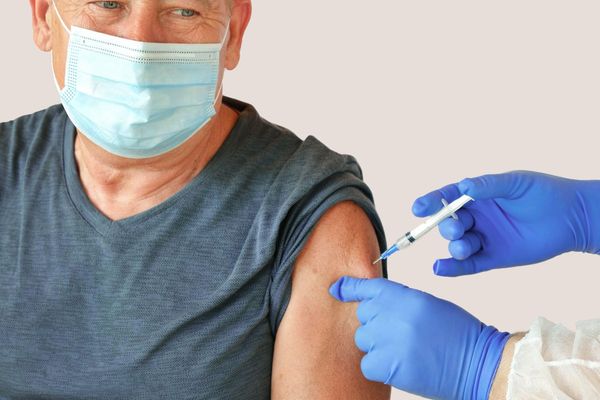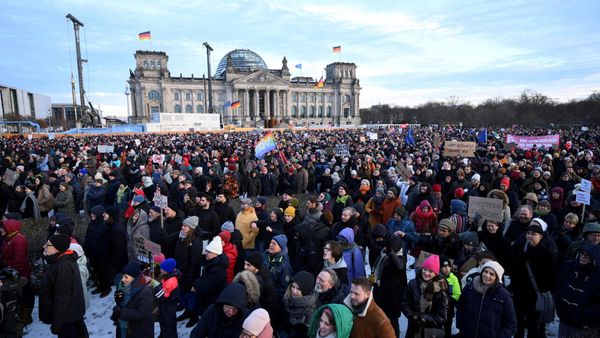
This is part three in a series. For the rest of the series, go here.
At the Ukrainian border crossing in Palanca in southern Moldova, a man stands next to his new Audi with tinted windows. A young woman sits in the front seat, her legs splayed out the door to get some sun.
The man has a stocky, muscular build and wears a black shirt, grey tracksuit pants and heavy-rimmed glasses. He’s approaching refugees who have just made it across the border, offering rides for cash to Moldova’s capital, Chișinău. Many of the refugees have been travelling for days, some for weeks, spending nights in bomb shelters after fleeing attacks in the east.
He’s one of seven private drivers attempting to earn money from Ukrainians fleeing war on the day I visit. One taxi driver said his income had been slashed since the war started, with no tourists and free transportation for refugees.
One Korean-Ukrainian family, travelling with an elderly baby and a newborn, are stressed and don’t know whom to trust. They’re receiving conflicting information and just want to reach somewhere safe and comfortable as quickly as possible.
There’s no need for them to pay for a ride. Free transport is available at the crossing: minibuses, adorned with logos of NGOs and fitted with scannable QR codes to show where the bus is going, take people to a nearby hub. There they have access to emergency healthcare, food and supplies. Their names and onward destination are registered with the government. Free buses then take them to Huși in Romania or Chișinău where temporary accommodation and more free transport links are available.
Volunteers attempt to tell the Ukrainians they don’t need to pay for anything. But the man in black intervenes — the trip takes too long, I hear him telling the Korean-Ukrainian family. “Ride with me and it will be faster,” he says to them. “I’ll drop you off at the train station in Chișinău for 200 euros.”

When I speak to the man, things don’t add up. He speaks perfect English yet says he lives in a regional and largely impoverished part of Moldova — and has an expensive car.
He denies approaching refugees, telling me he’s waiting for a friend. He eagerly shows me an email that he said is from one of his previous passengers that he helped — but the email is addressed to the Minister of Social Assistance and Sanitation Boris Gîlca, which the man clearly is not.
After speaking to me, he drives away — with no “friends” or passengers except for the young woman who arrived with him.
We don’t know what the man’s intentions were. But his presence is concerning — trafficking experts, crisis coordinators and NGO representatives have told Crikey scores of suspicious people have flocked to the border.
While country officials deny trafficking has taken place, pointing to the lack of prosecutions, those on the ground say it’s a different story, arguing anti-trafficking measures have come too little, too late.
Authorities can’t police everything
One of the key issues with private drivers is they often intervene at border crossings — before people can register their names and onward destination with local authorities or NGOs.
Police presence has ramped up. I’m stopped each time I arrive at a new transit hub or border crossing, and my male travel companion is interviewed about what he’s doing there.
But police can’t be everywhere at once. At the Palanca border crossing in Moldova, where private drivers openly roam, Ctalin Gritco — a volunteer from the Agency for Technical Cooperation and Development (ACTED), a French humanitarian NGO — said volunteers are wary not to cause conflict with drivers and were focused on doing their job: “The best thing we can do is talk to the refugees afterwards and tell them they don’t need to pay.”
Moldovan police have started to patrol the area. They check whether the cars are registered taxis, have meters and are charging the correct fare — if not, they issue a fine and send the drivers on their way. Ten cars have been sent away from the border the morning I visit.

But it’s difficult to oversee everything, local police officer Cazacenco Igor says. His team patrols both the border and the nearby transit hub, but as they’re a small local police force, there’s not enough manpower to handle both at once. “We try to monitor … but we also have to be here [at the hub],” he said.
Police also can’t stop Ukrainians from accepting rides or offers if they want to. Unique to this refugee crisis, no long-term accommodation has been set up. Ukrainians instead rely on the goodwill of locals, renting apartments for free or at a subsidised cost and staying with host families. The United Nations has urged the UK government to stop matching Ukrainian women and children to single male hosts, arguing its system is not appropriate.
While the UK conducts background checks on host families, many offers are unofficial and solicited online or through Facebook. One family I speak to outside the Przemyśl Tesco refugee hub — two teenage children and their mother — are catching a bus to Germany but have no idea where they’ll stay and plan on searching online for a host family. Another group, travelling with three children — the youngest is just 10 — say they found a man online they’ll stay with, again in Germany.
Traffickers are tricky to catch
Trafficking is a business of supply and demand — when demand goes up, there are financial incentives for individuals to enter the trade. Google searches for “Ukraine prostitute” and “Ukraine sex” reached 10-year highs in the days after the war erupted.
This means new criminals enter trafficking rings alone and ad hoc. They may drive a person to their home and make them work in domestic or sexual servitude to pay off a debt or sell them to a third party they met anonymously online. Once a victim has their phone taken off them, finding them — especially without an established route or trafficking ring to follow — is a challenge.
Allison Byrd is the Special Projects Coordinator for Unbound Global, an anti-human-trafficking organisation — she spent two weeks on the ground in Poland, looking out for traffickers and educating refugees about the dangers.
“There’s almost two types of trafficking. You have the international organised crime and people who do this professionally, and then you have people who, you know, are just individuals and saw an opportunity for economic gain,” she said.
Byrd said she saw a multitude of these people at the Przemyśl train station in Poland. She said she saw men covertly filming children and approaching them with jokes and chocolate, drivers offering lifts but only if the women agreed quickly, and men whose stories would change the second they were questioned.
One man she questioned became aggressive before sprinting away. The woman who was going to be his passenger had no idea of the danger she was in. She had been living at the train station for two days, hadn’t slept properly for more than a week, and was desperate to change her kid’s nappies. She was thankful for Byrd’s intervention and didn’t realise how simple human trafficking could be. Stress, trauma and fatigue had made her vulnerable to accepting risky situations.
Byrd said she looks out for a few things: people who won’t offer lifts to men; who get nervous or stressed when questioned or when workers take photos of their licence plates; who put time pressure on people to get into cars; who look for cash in exchange for rides; and who won’t hand over their social media or ID cards to registered NGO workers.
But she added that prosecuting people is incredibly tough. “It’s a hard crime to arrest someone before it happens [to prove] intent to traffic.”
Zero charges despite claims of unsavoury people
And at the busiest border crossing in Europe, zero arrests have been made, Przemyśl police department spokesperson Malgorzata Czechowska tells Crikey. She said police presence has nearly tripled to 600 officers since the start of the Ukrainian invasion, with officers redeployed from neighbouring regions and working overtime to patrol the area.

“They’re present, very, very present, and are protecting people on trains, at the borders, everywhere,” she said, adding the officers were attempting to escort refugees to official registration areas and NGOs, making sure they didn’t get into cars with unregistered drivers.
But her department wasn’t aware of claims from Red Cross staff at Przemyśl’s converted Tesco supermarket that convicted child sex offenders and others with known criminal histories attempted to enter the site and approach refugees. Across Poland, no one has been charged with intent to traffic.
To read the next part in this series, click here.







